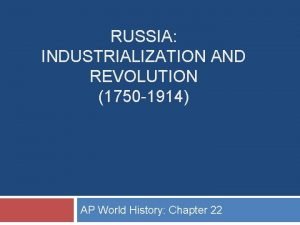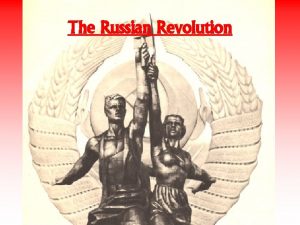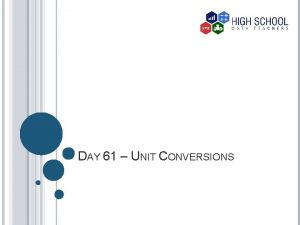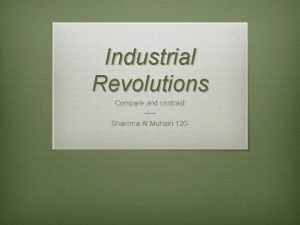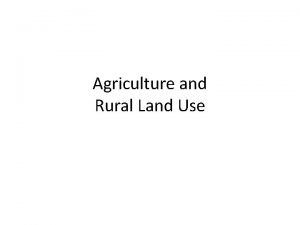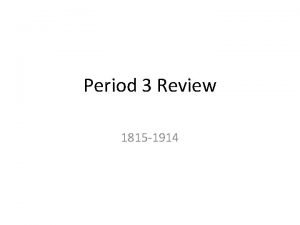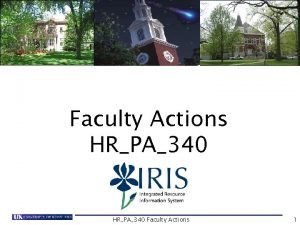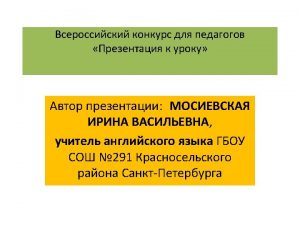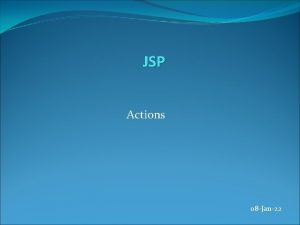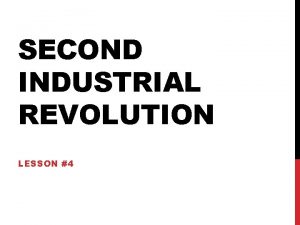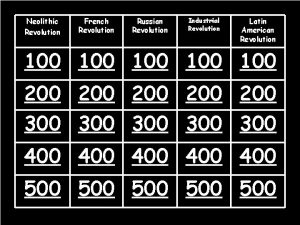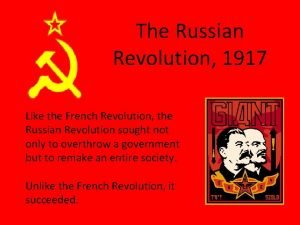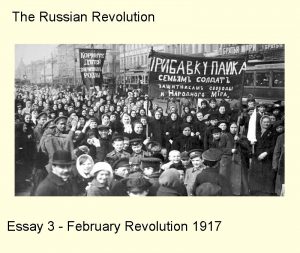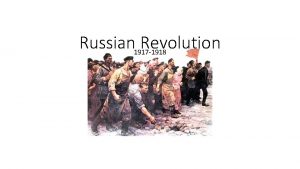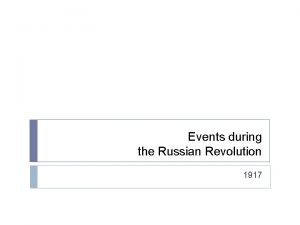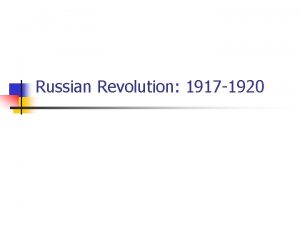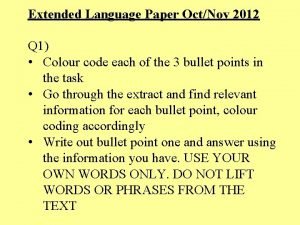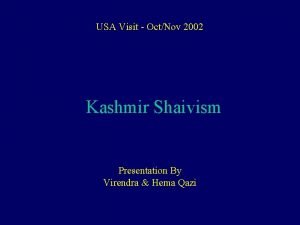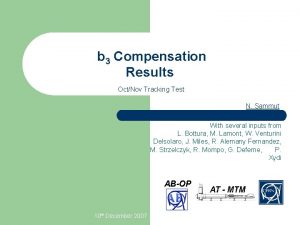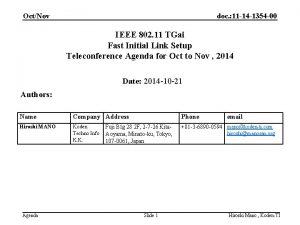The Second Revolution of 1917 OctNov 1917 Actions


















- Slides: 18

The Second Revolution of 1917 Oct/Nov 1917

Actions of the Provisional Government – mini test What were the main decisions of the provisional government in terms of each of the following? 1. Censorship 2. The release of political prisoners 3. The First World War 4. An election 5. The redistribution of land 6. The feeding of the people 7. The Okhrana

Stability • Stand up in a position which reflects how stable or unstable Russia was by October 1917.

In pairs discuss the following What are they/ happened? Put them in chronological order 1. 2. 3. 4. 5. 6. July days, Petrograd Soviet, Kornilov Affair, Formation of Trotsky’s Red Guard, April Theses-“Peace Bread Land” Return of Lenin

Outcomes • All will understand the basic events of the October Revolution and answer simple questions on it • Most will be able to answer more complex questions on it • Some will be able to see how it has been interpreted in different ways.

Look at these three exam questions are they the same or different? How would you go about answering them? 1. Explain why the Bolsheviks were able to seize power in Russia in October 1917. 2. Describe key features of the October Revolution in 1917. 3. Was the failure of the Provisional government the main reason why the Bolsheviks were able to seize power in 1917? Explain your answer. You may use the following information to help you answer it • The Provisional Government’s decision to stay in the War • The Return of Lenin and the April Theses • The Bolshevik Red Guard • The Kornilov affair

‘coup d’etat’ • By October 1917 the Bolsheviks felt they were in a position to stage a ‘coup d’etat’ • Seize something

Discussion • If you wanted to plan to attack a City what would you do and why • Extension – Think - How is this different from the First Revolution?

• If you were Trotsky and planning to attack Petrograd, what would you do, in what order and why?

The Bolsheviks seized control in one night in October 1917. 1. Trotsky got the support of the troops at the Peter & Paul Fortress. 3. At 10 p. m. a group of less than a dozen Red Guards seized the government headquarters. The government had fled and there was no resistance. 2. Bolshevik Red Guards captured important places such as bridges, the telephone exchange and radio station. 4. At about 1 a. m. Lenin stood up at a meeting of the All Russian Congress of Soviets, took off his disguise and announced that the Bolsheviks had now taken control in the name of the Soviets. No one had voted the Bolsheviks into power, not even the Petrograd Soviet. But now they were in control of Petrograd.

Watch this clip • http: //www. youtube. com/watch? v=tk. Wey. Vq 9 jo 0 Whilst you are watching it consider the following questions • Approximately how many people do you think were involved? • Is the film original footage or made after the event? • Write down as many adjectives to describe it as possible?

Look at the written source and picture – compare them - who might have written them? “The October Revolution was a shambles. Some of the sailors who were expected to help the Bolsheviks arrived too late. The huge field guns were too rusty to fire. No one could find the red lantern to signal the start of the attack. The Bolsheviks only succeeded in 1917 because hardly anyone supported the Provisional Government. Even some of the soldiers in the Winter Palace decided to slip away. Instead of fighting they went to eat their food in the restaurants of St Petersburg. In fact only five people died in the Bolshevik seizure of power. ”

Interpretations of the Oct revolution • Due to what happened after the seizure of power, the scale and drama of the revolution has been exaggerated to match its importance. At the time it was only another drama in a year full of action, violence and political events.

Read sheet • Add notes to sheet in boxes

Look at these three exam questions- How many marks? How much time? 1. 2. 3. Explain why the Bolsheviks were able to seize power in Russia in October 1917? Describe key features of the October Revolution in 1917. Was the failure of the Provisional government the main reason why the Bolsheviks were able to seize power in 1917? Explain your answer You may use the following information to help you answer it • The Provisional Government’s decision to stay in the War • The Return of Lenin and the April Theses • The Bolshevik Red Guard • The Kornilov affair

On the sugar paper in groups • Pick a question answer together using note books • You may choose to challenge yourself and not use books! • Swop answers • Use mark scheme to mark (on website board)

Pick a question to do for homework • Write question in book

6 minutes to do a 6 minute question!!! 1. Describe key features of the October Revolution in 1917.
 Russian revolution of 1917 definition ap world history
Russian revolution of 1917 definition ap world history Triple alliance ap euro
Triple alliance ap euro March 1917 revolution
March 1917 revolution 186 282 miles per second into meters per second
186 282 miles per second into meters per second Clustered definition ap human geography
Clustered definition ap human geography First and second industrial revolutions
First and second industrial revolutions The second agricultural revolution coincided with
The second agricultural revolution coincided with Agricultural revolution
Agricultural revolution First urban revolution hearths
First urban revolution hearths The second agricultural revolution
The second agricultural revolution Timeline for the industrial revolution
Timeline for the industrial revolution How could the french revolution have been avoided
How could the french revolution have been avoided Third agricultural revolution
Third agricultural revolution Russian revolution vs french revolution
Russian revolution vs french revolution Tư thế ngồi viết
Tư thế ngồi viết Diễn thế sinh thái là
Diễn thế sinh thái là Thế nào là giọng cùng tên?
Thế nào là giọng cùng tên? Thể thơ truyền thống
Thể thơ truyền thống Phép trừ bù
Phép trừ bù
